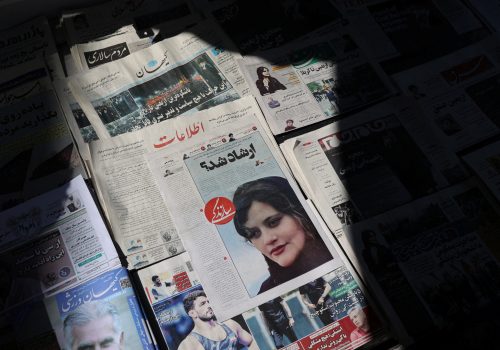What the ICJ ruling on the Central Bank of Iran means for the US and the Islamic Republic—and those seeking reparations for state-sponsored atrocities
On March 30, the International Court of Justice (ICJ) issued its final judgment on a case between the Islamic Republic of Iran and the United States on the fate of “Certain Iranian Assets.” These assets include about $1.8 billion belonging to the Central Bank of Iran (CBI) (known in the text as “Bank Markazi”) that the US froze in 2012. Iran brought the case in 2016 under the bilateral Treaty of Amity, Economic Relations, and Consular Rights.
In short, the ICJ judgment for Certain Iranian Assets (Islamic Republic of Iran v. United States of America) upheld a US objection related to jurisdiction—effectively dismissing Iran’s claims related to the CBI—and rejected four of Iran’s claims alleging US violations. However, it denied a US objection related to admissibility and found that the US violated another four obligations. It ordered the US to compensate Iran, giving the parties twenty-four months to decide the amount. If they do not come to a consensus—which, given tensions between the two governments, is likely—either party can request that the ICJ determine the amount “on the basis of further written pleadings limited to this issue.”
The judgment contains wins and losses for both sides. It allows longstanding efforts to pay the families of victims of Iranian government terrorism to move forward. However, it rejects several US provisions that aim to widen the pools of funds available to victims of state sponsors of terrorism. This judgment may increase global caution in attempts to seize and repurpose funds linked to Iran, Russia, and their other allied countries.
Background
The United States designated Iran as a “state sponsor of terrorism” (SST) in 1984. In 1996, it amended the Foreign Sovereign Immunities Act (FSIA) to introduce the “Terrorism Exception,” which removed the sovereign immunity of SSTs in certain cases, allowing lawsuits against the states themselves for acts such as torture. In 2002, the US enacted the Terrorism Risk Insurance Act (TRIA). Under Section 201(a), the TRIA allowed blocked assets of a state sponsor of terrorism to “be subject to execution or attachment in aid of execution in order to satisfy” a judgment under the FSIA Terrorism Exception. In 2008, an additional amendment to the FSIA created Section 1610(g)(1), allowing the assets of state-owned entities of SSTs to be available to satisfy judgments—even when not previously blocked. Executive Order (EO) 13599, signed by President Barack Obama in 2012, then blocked all assets of the Islamic Republic, including those of the CBI.
In 2001, victims of a 1983 bombing of a US Marine Corps barracks in Beirut, Lebanon sued the Iranian government in Peterson v. Islamic Republic of Iran. The US District Court for the District of Columbia found the Iranian government legally responsible in 2003 and, in 2007, it issued a default judgment, awarding the victims’ families a total of over $2.66 billion in damages. The victims brought actions attempting to enforce the judgment, including against assets owned by the CBI that were held in bonds in New York. The case made it to the Supreme Court, which ruled in favor of the victims in April 2016.
In response to these US actions, Iran launched the case with the ICJ in June 2016 for violation of the Treaty of Amity. The complaint argued that the US was “attempt[ing] unlawfully to permit or assist the seizure and attachment of the assets and interests of Iran and Iranian State-owned companies, including” the Central Bank of Iran. The violations alleged included, inter alia, expropriation of the property of Iranian state-owned entities, including the CBI.
Summary of the ICJ decision
The judges in this case disagreed considerably in evaluating each of the questions. Most of the decisions were split, and thirteen of the fifteen judges issued separate or dissenting opinions. While not unheard of, both occurrences are rare and point to the extent of the disagreement.
While the court issued a judgment on several jurisdictional and admissibility questions in 2019, it dealt with two remaining questions here: a jurisdictional question of whether the CBI counted as a “company” within the meaning of the Treaty of Amity, and an admissibility question of whether Iran failed to exhaust local remedies before bringing the case to the ICJ.
For the former, the ICJ analyzed the CBI’s activities and, looking at their purpose—rather than nature—found that the bank’s operations were not sufficiently of a commercial character to be considered a “company” under the Treaty of Amity. Its rights were, therefore, not protected under the treaty, which applies to “nationals” (i.e. natural persons) and companies. Based on this finding, the ICJ determined that it did not have jurisdiction over claims related to Articles III, IV, and V of the Treaty of Amity “predicated on the treatment accorded to” the CBI. However, the vote on this issue was strongly divided, with five judges voting against the decision. Notably, the relevant dissents—those of Judges Mohamed Bennouna, Abdulqawi Ahmed Yusuf, Patrick Lipton Robinson, and Nawaf Salam, and Judge ad hoc Djamchid Momtaz—all raised concerns that the judgment’s rationale contradicted the 2019 decision, which looked to the nature of activities for characterizing an entity as a “company” within the meaning of the Treaty of Amity.
On the admissibility question, the ICJ held that the Iranian companies had “no reasonable possibility of successfully asserting their rights in United States court proceedings” based on the “legislative character of the contested measures and the primacy accorded to a more recent federal statute over the treaty in the jurisprudence in the United States.” Therefore, it rejected the US objection.
Questions on the merits
The ICJ first rejected the three defenses that the United States claimed: that Iran came to the court with “unclean hands”; that Iran committed “an abuse of rights by seeking to apply the Treaty of Amity” to matters that, in the US’s view, were “unrelated to commerce” in order to circumvent its obligations to pay reparations; and that, under Article XX(1)(c) and XX(1)(d) of the Treaty of Amity, Iran’s claims on EO 13599 were outside the ICJ’s jurisdiction. In dismissing the claim related to XX(1)(d), the ICJ did not outright reject the US position that EO 13599 was necessary from a security perspective—and thus permitted under the Treaty of Amity—but instead ruled that the US had not adequately demonstrated why it was necessary.
The ICJ then turned to the six remaining claims, which alleged violations of the Treaty of Amity. For all substantive claims where the ICJ found in favor of Iran, the votes were split, with Judges Julia Sebutinde and Dalveer Bhandari and Judge ad hoc Barkett ruling in favor of the US each time.
Ruling for Iran, the ICJ found the following US violations:
- Article III(1) and IV(1): First, recognition of juridical status (i.e. legal personality) of a company “entails the legal existence of the company as an entity that is distinct from other natural or legal persons, including States.” Further, FSIA Section 1610(g)(1), TRIA Section 201(a), and EO 13599 were unreasonable measures in that their “adverse impact [was] manifestly excessive in relation to the purpose pursued,” violating Article IV(1). On the basis that these measures were unreasonable, they unjustifiably disregarded the legal personality of Iranian companies and violated the obligation to recognize the juridical status of Iranian companies under Article III(1). Notably, while the judgment addressed Iran’s claims around these two provisions together, as they are “closely related,” dissenting opinions such as those of Judges Sebutinde and Peter Tomka and Judge ad hoc Rosemary Barkett criticized the “conflat[ion]” of the Articles, and disagreed that the Article III(1) finding “flow[ed]” from that of Article IV(1).
- Article IV(2): The application of FSIA Section 1610(g)(1) and TRIA Section 201(a) amounted to “takings without compensation of the property and interests in property of Iranian companies.” While a judicial decision to order the attachment and execution of property is not per se a taking or expropriation, the provisions and their applications in this circumstance were “unreasonable measures.” However, Iran did not adequately specify the property affected by EO 13599, so the related allegations were considered unsubstantiated.
- Article X(1): Financial transactions or operations, even when intermediaries are involved, “constitute ancillary activities integrally related to commerce.” EO 13599, along with FSIA Section 1610(g)(1), constituted an “actual impediment to any financial transaction or operation to be conducted by Iran or Iranian financial institutions in the territory of the United States.” FSIA Section 1610(g)(1) and TRIA Section 201(a), along with certain enforcement proceedings, also caused “concrete interference[s] with commerce.”
Ruling for the US, the ICJ found that Iran did not prove the following violations of the Treaty of Amity:
- Article III(2): Iran did not establish that the US curtailed Iranian companies’ rights to appear before US courts, nor did the US actions “call into question the freedom of access” or the “aim of prompt and impartial justice” as promised by the Treaty of Amity.
- Article IV(2): A second obligation in this provision, to provide “constant protection and security,” was related to physical harm—rather than legal harm, which was covered by Article IV(1)—and the US did not violate this obligation.
- Article V(1): Because the ICJ already ruled that the US measures constituted takings without compensation, the measures could not also deprive “Iranian companies of the right to dispose of their property.” Namely, the obligation to allow the disposal of property presupposes actual ownership and is not meant to apply to situations concerning expropriation. While EO 13599 prohibited property disposal, Iran did not identify any property other than the assets that were frozen under EO 13599, and the complaint did not address any other EOs.
- Article VII(1): When reading “restrictions on the making of payments, remittances, and other transfers of funds,” “restrictions” should be interpreted as limited to “exchange restrictions” given the context of the Article as a whole, and Iran’s claims were not related to exchange restrictions.
Effects
First, ICJ judgments are legally binding, and so the US will still need to cooperate with Iran in the compensation determination process and ultimately pay the agreed-upon amount. While the ICJ does not have enforcement powers and both the US and Iran have ignored rulings in the past, failing to cooperate would risk further discrediting the already-tarnished US reputation with the ICJ and under international law.
Beyond that, the ICJ did not rule on violations related to the CBI for Articles III, IV, and V, and so efforts to pay out judgments using the bank’s funds should be able to move forward. Indeed, a US official referred to the verdict as “a major victory for the United States and victims of Iran’s state-sponsored terrorism.” This is a particularly timely development given that on March 22, a New York federal judge ordered the CBI to pay out $1.68 billion to the victims. That said, the Certain Iranian Assets judgment only found that the ICJ did not have jurisdiction over the claims concerning the CBI—it did not uphold the US’ actions and it ruled against the US on several major points. Especially in light of the split votes on the jurisdictional question and strident dissents on topics such as unilateral sanctions, future opinions on related matters could call the legality of related US tactics into question.
The US withdrew from the Treaty of Amity in 2018, and so any actions after the withdrawal that took effect in 2019 would not fall under the scope of the decision and could not lead to further litigation under this treaty. However, Iran launched a separate case with the ICJ in 2018, Alleged Violations of the 1955 Treaty of Amity, Economic Relations, and Consular Rights (Islamic Republic of Iran v. United States of America known as “Alleged Violations of the 1955 Treaty of Amity”). This concerns what Iran refers to as the “8 May sanctions,” which were imposed (or reimposed) after the US withdrew from the Joint Comprehensive Plan of Action (JCPOA) in May 2018. While the case’s claims do not fully overlap with Certain Iranian Assets, it again alleges that the US breached Articles IV(1), VII(1), and X(1).
Alleged Violations of the 1955 Treaty of Amity will give the ICJ the chance to further engage on points of contention, such as the definition of “company.” The ICJ will also be able to weigh in on several types of sanctions regimes, including targeted sanctions against individuals and entities, and to offer further jurisprudence on issues such as national security under Article XX(1)(d), which the US has again raised as a defense.
Given the withdrawal from the Treaty of Amity, the US is not obligated to address the points raised by the ICJ by amending laws or revoking EOs. However, any other countries affected by the relevant provisions of the FSIA and the TRIA and by Executive Orders similar to EO 13599, and which have comparable bilateral treaties—with an ICJ dispute clause—with the US, may bring similar claims before the ICJ. While an exactly similar fact pattern is unlikely, states may begin calling on the principles at the heart of the decision to bring related cases—especially if Alleged Violations of the 1955 Treaty of Amity issues strong rulings against US sanctions regimes. Further, SSTs—and any other regimes worried about their assets—may begin to use this judgment as guidance on how to best protect their funds, namely by storing them in private entities protected through bilateral or multilateral treaties rather than in central banks.
To shield itself from future litigation, it may still be in the US’s best interests to amend its legislation and EOs to address the issues that the ICJ raised. For example, in determining whether the legislative provisions were “manifestly excessive,” the ICJ looked at the language to determine that they “employ very broad terms, which are capable of encompassing any legal entity, regardless of Iran’s type or degree of control over them.” Further, the ICJ points to FSIA Section 1610(g)(1)’s dispensing of the requirement that assets were previously blocked. It also looked to the application, finding that they were used “in cases in which those companies could not participate and in relation to facts in which those companies do not appear to have been involved.” Narrowly defining the language of the legislation to focus on entities under an SST’s direct control and limiting the available property to that which was previously blocked, and then taking care to apply the provisions in situations where the companies were able to participate in the proceedings, may sufficiently address the limitations.
Such amendments—and those to address the remaining violations—would presumably shrink the pool of available funds, but would ultimately increase the efficiency and ease with which victims can be compensated. Further, they will better keep the US in line with international standards, strengthening multilateral action. This opinion is likely to play a role in the calculus other states take as they apply and manage targeted sanctions, especially in their ongoing efforts and conversations around freezing and seizing billions of dollars’ worth of Russian bank funds and frozen assets.
The ICJ findings related to legal personality, “unreasonableness,” and expropriation will add to existing international case law that will guide these discussions—and likely trigger caution. By taking the judgment to heart and adapting its tactics, the US can continue to lead on these issues without sacrificing its integrity.
The ICJ judgment is a mixed bag—allowing the Central Bank of Iran payments to move forward, but also narrowing the avenues to collect damages from hostile countries that are legally responsible for unfathomable harms. However, the concerns raised—including unreasonable expropriation and lack of sufficient remedy—were not unexpected. In their dissent in Peterson, Justices Sonia Sotomayor and John Roberts compared the situation to an inter-neighbor boundary dispute and raised concerns that Congress “decided th[e] case by enacting a bespoke statute.”During recent efforts to seize frozen oligarch assets, the American Civil Liberties Union (ACLU) flagged a bill lacking sufficient due process protections as unconstitutional.
This judgment should not be considered a death knell for using frozen funds as damages. Instead, it should galvanize US leaders to improve and strengthen the relevant laws to ensure that they can withstand international scrutiny and litigation—and so better serve the victims they are meant to benefit.
Celeste Kmiotek is a staff lawyer for the Strategic Litigation Project at the Atlantic Council.
Further reading
Wed, Apr 19, 2023
Holding the Islamic Republic of Iran accountable for atrocity crimes
Issue Brief By Celeste Kmiotek, Alana Mitias, Nushin Sarkarati
Under the principle of universal jurisdiction, certain domestic justice systems allow prosecutions in national courts for crimes committed abroad, regardless of the victim’s or perpetrator’s nationality. This manual outlines the universal jurisdiction process in selected European states for those pursuing prosecutions of crimes committed by the Islamic Republic of Iran.
Thu, Dec 10, 2020
Closing the accountability gap on human rights violators in the Islamic Republic of Iran through global litigation strategies
Report By Gissou Nia
Gissou Nia presents recommendations for new laws, amendments to existing laws, and the creation of enforcement mechanisms to aid in the effort to combat impunity for the IRI’s human rights violations and atrocity crimes.
Wed, Mar 8, 2023
Gender persecution is happening in Iran. Targeted sanctions would be a step toward accountability.
New Atlanticist By Celeste Kmiotek, Lisandra Novo
Designating the Supreme Council of the Cultural Revolution, a principal institution behind the systematic oppression of women in Iran, would put its members on notice.
Image: A man walks past the Central Bank of Iran in Tehran, Iran August 1, 2019. Nazanin Tabatabaee/WANA (West Asia News Agency) via REUTERS


